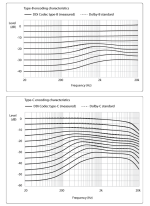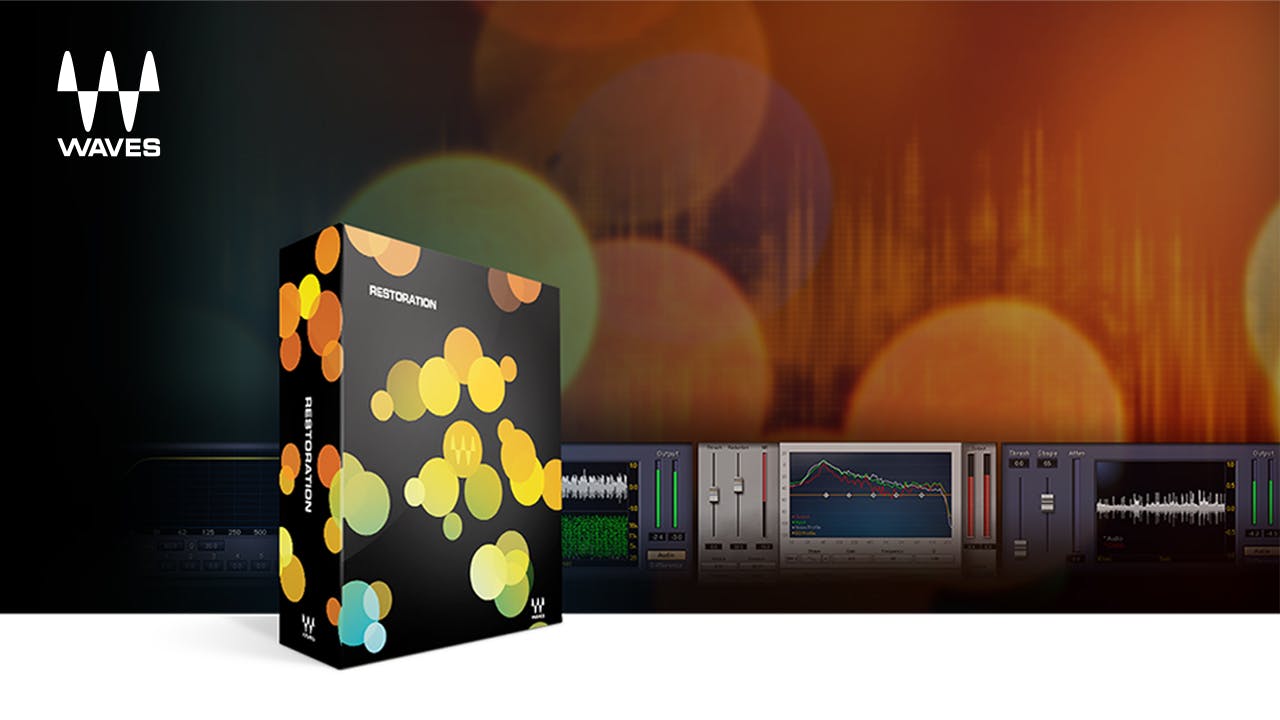I am currently transferring some valuable cassettes to digital. What happens to the audio when cassettes recorded with Dolby B or C are recorded without decoding?
Last edited:
Carl,The frequency response will look like this if not decoded - no bass:

Thanks Art,Carl,
That is generally not true. The Dolby B&C pre-emphasis boosts low-level high frequency signal, but as level increases, boosts less.
Signal recorded above -10 are hardly affected by Dolby B.
Playing back an encoded tape without using Dolby results in more high frequency level and more tape hiss, but bass signal, generally recorded at higher level than high frequency, is largely unaffected.
Without the de-emphasis effect of the Dolby decoder, the sound will be perceived as brighter as low recording level high frequencies are emphasized, while low frequency signal dynamics remain the same.
View attachment 209620
Digital codecs have been designed to duplicate the dynamic response of the analog Dolby B&C encoder/decoder:
http://www.anaxwaves.com › DDiCodec
DDi Codec (software Dolby-C and Dolby-B compander)
Thanks Carl, I have Doby B but not C deck so I will live with extra hiss and edit it out in my DAWCarl,
That is generally not true. The Dolby B&C pre-emphasis boosts low-level high frequency signal, but as level increases, boosts less.
Signal recorded above -10 are hardly affected by Dolby B.
Playing back an encoded tape without using Dolby results in more high frequency level and more tape hiss, but bass signal, generally recorded at higher level than high frequency, is largely unaffected.
Without the de-emphasis effect of the Dolby decoder, the sound will be perceived as brighter as low recording level high frequencies are emphasized, while low frequency signal dynamics remain the same.
View attachment 209620
Digital codecs have been designed to duplicate the dynamic response of the analog Dolby B&C encoder/decoder:
http://www.anaxwaves.com › DDiCodec
DDi Codec (software Dolby-C and Dolby-B compander)
All we hear is less bass and more HF - the brain does not know if HF has been increased or LF reduced. I will restate my original comment as '... -less perceived bass'!Without the de-emphasis effect of the Dolby decoder, the sound will be perceived as brighter as low recording level high frequencies are emphasized, while low frequency signal dynamics remain the same.
Carl,All we hear is less bass and more HF - the brain does not know if HF has been increased or LF reduced. I will restate my original comment as '... -less perceived bass'!
Thanks Carl, that makes sense. I appreciate all the advice.All we hear is less bass and more HF - the brain does not know if HF has been increased or LF reduced. I will restate my original comment as '... -less perceived bass'!
Hi Art, I believe we are looking at this from different viewpoints but would like to think that we are both correct! I am not suggesting that the bass is reduced as part of the processing, as you correctly state, but that a Dolby processed signal replayed without 'decoding' would sound somewhat bass-light or HF-heavy. Cheers, Carl.Carl,
The bass level is not reduced at any level in the Dolby B or C processing, if you perceive it as reduced, your perception is quite different than mine.
I sometimes recorded cassettes with Dolby and intentionally played them back without simply to restore some of the high frequency level lost in the small, slow tape recording, and head misalignment between machines.
That said, the dynamic range of music I recorded seldom dropped into the low levels (you posted the -60dB compensation HF boost) where Dolby B or C have the most effect, so the difference was not much between "with and without".
Art
Thanks to all of you for the helpful responses. Now, once I have the cassettes transferred to digital are there any plug-ins or programs to enhance the audio.I think some over-thinking and specification believing is happening. In the cassette days it was VERY common for people to record with Dolby B and turn it off for replay to get 'extra' HF, with of course some extra hiss component. Dolby B just worked and people withy cheap machines had some switches to adjust for taste. Many machines had three options for replay EQ too - and the effects was mostly perceived as top end changes.
Dolby C had a rough time, because Dolby was inextricably linked with 'noise reduction', as in removing hiss. Dolby C with the record processing and the reciprocal expansion didn't nice when settings were played with - as in turning the selector to Dolby B, or simply turning everything off. Dolby C encoding needs dealing with to restore dynamics to what they should be and the EQ curve. Oddly - back in those days we never used the specs like used here. The graph used above gives the impression that there was no bass, and loads of treble, but the scale on the blue graph makes it look far more than what is really was when you look at the curve and then the flat section.
Dolby B applied variable gentle compression depending on the HF content - so don't take this as a standard compression method that can just be reversed. When you look at the curve of Dolby B off, Dolby B on and the impact of HF signals you can see the two tramlines have a gentle connection - it's not a straight line compression you can apply a straight line expansion to - like the HXpro thing.
Dolby B replay with it off just makes a brighter sound - which you can leave in, or massage it out to taste. Unlike Dolby A there was no line-up or alignment - it just worked.



Thanks Jeff, I am looking for cassette specific programs and these sound like what I need so thanks again.Here is a list of 248 free VST plugins that you can use.

The 40 Best Free VST Plugins in 2024
There are tons of free plugins out there, but which ones are actually good? Our fully updated list names all the best ones in each category.blog.landr.com
If you are looking for commercial solutions, Izotope has their RX series plugins targeted at these sort of use cases
Waves also have some good tools like this if you want to check them out as well.
RX 10 Background Noise Removal & Audio Cleanup Software | iZotope
RX 10 is the award-winning audio cleanup software trusted by top post production engineers to quickly remove background noise and restore damaged audio.www.izotope.com

Restoration | Bundles - Waves Audio
With five intuitive state-of-the-art noise reduction tools Restoration includes everything you need to revive damaged recordings.www.waves.com
Thanks Paul, very helpfull reply.Edward - For every plug-in claimed to enhance the sound there will be at least three people telling you they are dreadful. In general terms all you really want is EQ, and that used quite generally, to your preference. There are quite a lot of 'excitement' type plug-ins but remember you've not got much HF left, and as you got rid of the hiss, these enhancer gizmos don't have enough to work on and can sound truly dreadful. So you are looking at things that will be looking to add in harmonics and stuff above 9K or so. Your tweaking will be quite limited. If the original cassette recording was a good one, you'll have few problems but if it sounds muffled and dull - your options are quite limited. Bringing up a missing top end will bring up all sorts of nasties!
